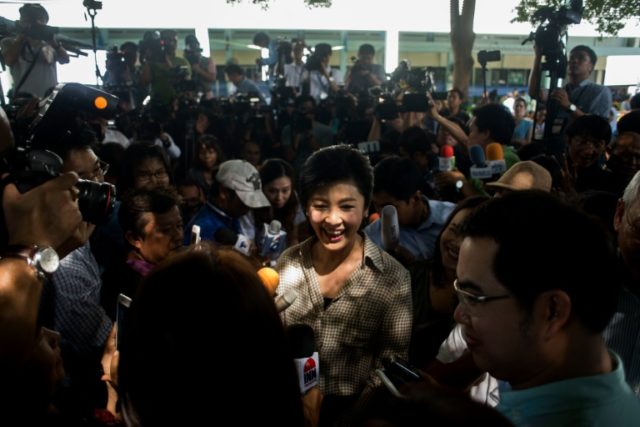Bangkok (AFP) – A referendum victory for Thailand’s ruling generals over a new constitution is a “backwards” step for the country, the toppled ex-premier said on Monday as the democracy movement reels from its first poll defeat in a decade.
The bitterly-divided kingdom has been ruled by a junta for two years since Yingluck Shinawatra’s government was booted from office.
The majority ‘yes’ vote in support of the charter was the first test of public opinion since 2014 coup, although independent campaigning and open debate was stifled ahead of the polls.
The vote lends legitimacy to a junta that says it alone can stabilise Thailand and detoxify politics after a decade of turmoil.
It also lands a hammer blow on the nation’s pro-democracy movement, which since 2006 has been winded by two coups, court rulings and a bloody military crackdown.
Unofficial results released by the Election Commission showed 61.4 percent of the country backed the document, with 38.6 percent voting ‘no’.
The turnout was just under 55 percent — a low number in part due to the ban on campaining.
“I accept the decision of the people,” Yingluck said in a social media post, in her first reaction to Sunday’s poll, adding she was “not surprised” at the result due to the bar on debating the document.
“I am saddened by the fact that our country is going backwards to an undemocratic constitution,” she added.
Sunday marked her family’s first loss at the polls since a charter referendum in the wake of a 2006 coup that toppled Thaksin Shinawatra — Yingluck’s billionaire elder brother who sits at the crux of Thailand’s political schism.
The Shinawatra clan have won all general elections since 2001, scooping up votes by promising greater wealth and opportunity to the nation’s poor, especially in the north and northeast.
Yingluck’s pro-democracy Peau Thai party had been widely assumed to still enjoy mass support and maintain the power to mobilise their voters.
But initial results from the northeast showed a narrow majority in support of the party position, with the ‘no’ vote squeaking by with 51 percent.
Experts said the vote in part reflected the impact of the junta’s ban on campaigning.
But was also likely a sign of a population wearied by a seemingly endless cycle of political conflict and inured to the rule of military that has for a decade successfully undercut democractic gains.
The military says its new constitution will end endemic political corruption and pave the way for a general election next year.
But critics say it aims to straitjacket civilian politicians and introduce a tightly controlled democracy under the stewardship of the military and its royalist allies.
The country’s tensions have been compounded by the frail health of 88-year-old King Bhumibol Adulyadej, as elites jostle ahead of the transition.

COMMENTS
Please let us know if you're having issues with commenting.